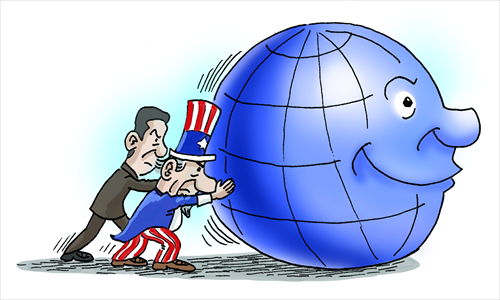
Illustration: Liu Rui/GT
"Do you still uphold the idea of 'G2?'"I asked Fred Bergsten, director of the Peterson Institute for International Economics, in Washington recently. Bergsten raised the idea of China and the US developing a "G2" partnership in 2008. He talked a lot to me, with the clear message that he still believes in the idea now.
About 10 years before, Robert B. Zoellick, former president of the World Bank and then US deputy secretary of state, used the term "stakeholder," hoping to describe the common interests shared by Beijing and Washington by comparing them with returns on shares.
The two concepts put China and the US on an equal level, but both of them have more or less put China's identity and position before that of the US.
After talking to dozens of scholars and officials in Washington, I discovered that although they have different views toward China, they have one thought in common, which is hoping China could truly become a global partner of the US.
However, what kind of partner China should be none of them could spell out.
Obviously, Washington wants to clarify China's position. But it can't keep up with the changes of the country. This is what the Americans are anxious about.
In the eyes of the US, China is the only country that has approached the US in terms of the comprehensive national strength, with its GDP bound to exceed that of the US. When the former Soviet Union was at its heyday, its gross industrial production was only 70 percent of that of the US. And Washington had already found a way to deal with the Soviet Union as early as the mid 1980s. But China surpassed the US in terms of gross industrial production in 2011, and the White House can do nothing about it.
As far as the US is concerned, China is a major power that is good at playing games with the super power. The diplomatic hegemony of the US has met the challenge of the Chinese development pattern, which is filled with incessant economic reforms and has kept selecting political talent.
The military supremacy of the US is faced with the pressure of China's port construction overseas as well as its promotion of high-speed rails and infrastructure abroad. The dollar hegemony, which is based on the US-dominated global financial order, is also challenged by the yuan. Playing games won't necessarily lead to conflict, while the changes have emerged silently. This is the brilliant part of China.
The US cannot make up its mind to completely "contain" China. Whenever the US tries to box with China, the latter would use tai chi in response. The booming bilateral trade of $550 billion per year has closely tied the mainstream of US commercial and business circles with China.
When the two sides were interacting with one another in every aspect, with overlapping interests, they kept a peaceful and friendly attitude, without any sign of entering into a Cold War. This is without doubt a signal that both nations are dedicated to walking away from the old historical logic of major power relations, and Chinese President Xi Jinping's visit to the US is another confirmation of such a status and will have profound significance.
Previously, Americans used to laugh at China's diplomacy by saying "you don't have as many allies as us." But I want to say, "We don't have as many enemies as you either."
Since the financial crisis, more Americans have become less confident in the US political system and diplomatic supremacy. They also lack the confidence to point fingers at China's system and development model. Hence, if the US wants to consider China as a global partner, China's value should not be underestimated.
China understands sharing its interests with others. The reason why Beijing is not willing to accept the concept of "G2" is that we don't want to share the "privilege" of global governance with the US. But China does go out of its way for the G20. It believes that the wisdom of the 20 countries that account for 80 percent of global GDP is more representative than the combination of Beijing and Washington only.
China is a global partner that always listens tolerantly to others. On the basis of sticking to safeguarding its own national interests, China maintains openness and flexibility toward the US, while trying to shift the disputes to common interests.
China always avoids turning nasty with others. Its border disputes and divergences of interests with neighboring countries are complicated. But China is the only major country that has not started a war or opened fire on a neighbor over the past 30 years.
Moreover, China always looks at long-term interests. It has enough strategic patience and willpower. China's two "100-year goals" aim at the revitalization of the nation. We are not eager to strive for hegemony against the US, nor are we willing to do so.
The author is executive dean of the Chongyang Institute for Financial Studies at Renmin University of China. opinion@globaltimes.com.cn
Read more in Special Coverage:

